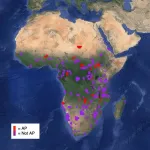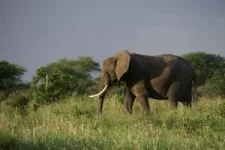(Press-News.org) (Santa Barbara, Calif.) — There’s an experiment going on in conservation in Africa. With biodiversity imperiled, and nations facing financial and political crises, some governments are transferring the management of protected areas to private, non-governmental organizations (NGOs).
This strategy seems to be paying off. NGOs can better manage corruption, making them attractive to large donors like the World Bank and European Union. Their capital can fund personnel, research and technology to more effectively manage protected areas and species. While these management changes appear to be working anecdotally, few if any studies have rigorously evaluated the results.
A team of researchers from institutions including UC Santa Barbara wanted to know how this trend affects wildlife and people. Surveying parks throughout the continent under private and government administration, they discovered that NGO management improves measures for wildlife, including by reducing elephant poaching, and increases tourism. Overall, management appears to improve under NGO control. However, they also discovered that in landscapes experiencing armed conflict, outsourcing park management also raises the risk of armed groups targeting civilians in and around protected areas. The team published their results in the Proceedings of the National Academy of Sciences.
“Protected areas, and conservation generally, do not exist in isolation from humans,” said lead author Sean Denny, a doctoral candidate at UC Santa Barbara’s Bren School of Environmental Science & Management. “In fact, conservation is, at its heart, about humans — it's about finding ways for humans and other species to coexist. This includes preventing extinctions caused by human activities like hunting and deforestation.” As a result, conservation often impacts people’s lives and livelihoods, outcomes that need to be taken into consideration.
African Parks as a case study
Denny and his two co-authors focused on the organization African Parks (AP) as a case study. AP is the largest NGO partnering with governments in Africa to administer protected areas. The South Africa-based non-profit is given complete authority to manage, staff and fund the parks.
AP’s primary mission is to conserve and restore wildlife populations in Africa, but they also seek to make protected areas benefit people through tourism and development projects, like building schools and hospitals for local communities. Due to their focus on restoration, they sometimes work in areas experiencing armed conflict, where wildlife is especially prone to being over-hunted and faces extreme pressure from hunting. But protecting wildlife in these landscapes can require high levels of security and enforcement, which could have unintended impacts on people and result in tradeoffs between wildlife conservation and human well-being. The authors were interested in exploring these trade-offs; and, because AP operates in conflict zones, they suspected AP’s activities might capture them.
But running a study at such a large scale presented a challenge: The authors had to compare outcomes in areas under AP’s management to what would have happened if AP were never given the reins. To do so, they ran a quasi-experiment in which researchers make use of real-world events to create treatment and control groups. In real experiments, researchers randomly assign subjects to one of these groups to ensure that their findings are due to the treatment and not simply down to prior differences. But Denny and company didn’t have this luxury.
Fortunately, AP published a map of protected areas in Africa that they believe are key to safeguarding the continent’s biodiversity and ultimately meet their criteria for future management. These “anchor sites” share key characteristics like a large size, strong legal status, limited agricultural activity and the potential to sustain large wildlife populations. Twenty-two of these anchor sites are already managed by AP, but the rest are managed by governments and in very few cases, by other NGOs.
The research team formed a treatment group from anchor sites that AP already administers. Their control group consisted of anchor sites not managed by AP or another NGO. “African Parks essentially created our control group for us,” Denny said.
Deciding what to look for
The team used a variety of metrics to measure the effects of private management on wildlife and people. They needed metrics for which data was available at a continental scale. For wildlife, they focused on elephant poaching and bird abundances. On the human side, they looked at tourism, wealth and armed conflict. To measure these outcomes, they drew on diverse datasets and platforms, including a dataset called MIKE that monitors elephant poaching; the citizen science platforms eBird and iNaturalist; Atlas AI, which measures wealth; and the Armed Conflict Location & Event Data Project, which measures incidences of armed conflict.
The researchers also used the Management Effectiveness Tracking Tool (METT) to look under the hood at how AP affects management practices themselves. Developed by the International Union for Conservation of Nature, this standardized questionnaire quantifies how well protected areas are managed. It reports data on planning, financial resources, law enforcement and stakeholder involvement. The METT can shed light on the mechanisms behind the outcomes observed in the other datasets.
Following the results
Denny and his co-authors were impressed by the results private management had for wildlife. It reduced elephant poaching by 35%, and increased bird abundance by 37%. “African Parks really appears to work for wildlife,” Denny said. “The fact that they can reduce elephant poaching in protected areas that are threatened by armed groups is really quite extraordinary.” NGO administration also increased tourism, but the effects on wealth were less conclusive.
The authors also found some important drawbacks, though. In areas already experiencing armed conflict, these changes can increase the probability that armed groups target civilians living in areas bordering those overseen by AP. They think this could be a result of armed groups redirecting their activity toward exploiting civilians when AP prevents them from operating in or extracting resources from protected areas.
“While the outcomes for wildlife were even stronger than we expected,” Denny said, “we were concerned by the conflict results, especially when combined with the potential decrease in decision-making inclusiveness that comes with private management.”
Looking under the hood
The Management Effectiveness Tracking Tool provided insights on the mechanisms behind these outcomes. African Parks is a juggernaut compared to many cash-strapped national governments. Results from the METT revealed that AP increased capacity and resources (in terms of budget and staffing), as well as design and planning. “In some management criteria, they really do seem to manage more effectively,” Denny said.
The authors also found that monitoring and enforcement within parks rose under AP. The organization uses sophisticated equipment — like aircraft, drones and remote sensing — to monitor illegal activity in their parks and enforce wildlife protection. This likely contributes to the benefits of AP management for wildlife, as well as the rise in likelihood that armed groups target civilians.
Notably, only one of the four categories measured by the METT appeared to fall under private park management: decision-making inclusiveness. The slight drop in this category didn’t surprise Denny and his colleagues since AP maintains tight control over its work. It does, however, point to an opportunity for improvement.
Managing more effectively
African wildlife is threatened, and NGOs are offering a potential solution. But it’s crucial to investigate the impacts of private conservation management to understand its strengths, weaknesses and opportunities for improvement. Outsourcing conservation appears to provide a path for protecting wildlife, but the accompanying increased enforcement can lead to problems for people.
One way to ensure that protected areas work for people, according to the researchers, is to include local communities in stewardship. In Denny’s opinion, ethical conservation requires compensating local communities for the costs they bear and including them in policy decisions.
“If, in conflict regions, civilians are bearing some unexpected costs of private protected area management, then it is especially important that they are involved in decision making,” he said. Another avenue is to make sure that conservationists, park managers and governments monitor the impacts of private management, not just on wildlife but also on people, and adapt when necessary.
Additionally, many national parks in Africa were created by colonial administrations, so they have deep colonial histories and legacies. Denny and his co-authors are eager to partner with African researchers to explore how this history affects local people’s perceptions of parks, and their preferences for how they’re managed and by whom. “By elevating local voices, perspectives and experiences, we can develop more meaningful research and support management practices that benefit both wildlife and local communities,” he said.
END
Outsourcing conservation in Africa
NGO park management reduces poaching and boosts tourism, but raises the risks for civilians in war-torn areas
2024-07-26
ELSE PRESS RELEASES FROM THIS DATE:
Study finds big disparities in stroke services across the US
2024-07-26
FOR IMMEDIATE RELEASE
Media Contact: Elizabeth.Fernandez@ucsf.edu, (415) 502-6397
Subscribe to UCSF News
Study Finds Big Disparities in Stroke Services Across the U.S.
Low-income communities are up to 42% less likely to obtain stroke center certification.
Hospitals in poor communities are significantly less likely to obtain certification for stroke services, which makes them unable to provide urgent, lifesaving treatment, UC San Francisco researchers are reporting in a 14-year study of the nation’s hospitals.
By ...
Media Tip Sheet: Urban Ecology at #ESA2024
2024-07-26
Interest in urban ecology is growing rapidly as cities expand and the need to understand urban ecosystems becomes more pressing. The Ecological Society of America’s upcoming Annual Meeting in Long Beach, Calif., Aug. 4–9, features a diverse array of talks and posters dedicated to this dynamic field.
Researchers from around the world will present their latest findings on how urban environments impact biodiversity, ecosystem services and human well-being. In addition to a Symposium devoted to the urban ecology of Greater Los Angeles, dozens of talks and posters will offer valuable insights ...
Michigan Plasma prize honors University of Illinois professor
2024-07-26
July 26, 2024
Contact: Kate McAlpine, 734-647-7087, kmca@umich.edu; Nicole Casal Moore, 734-709-1651, ncmoore@umich.edu; Phillip Kisubika, 217-244-7448, pkk18@illinois.edu
Image
ANN ARBOR—He has honed the power of plasma to advance semiconductor processing, high-quality thin films for magnetic hard drives, and fusion energy. For these and other accomplishments, University of Illinois Professor David Neil Ruzic has been chosen to receive the 2024 University of Michigan Prize for Excellence in Plasma Science and Engineering.
Ruzic is the Abel Bliss Professor of Engineering in ...
Atomic 'GPS' elucidates movement during ultrafast material transitions
2024-07-26
UPTON, N.Y. — Scientists from the U.S. Department of Energy’s (DOE) Brookhaven National Laboratory have created the first-ever atomic movies showing how atoms rearrange locally within a quantum material as it transitions from an insulator to a metal. With the help of these movies, the researchers discovered a new material phase that settles a yearslong scientific debate and could facilitate the design of new transitioning materials with commercial applications.
This research, recently published in Nature Materials, marks a methodological achievement; the researchers demonstrated that a materials characterization technique called atomic pair distribution ...
UMBC scientists work to build “wind-up” sensors
2024-07-26
An international team of scientists, including two researchers who now work in the Center for Advanced Sensor Technology (CAST) at UMBC, has shown that twisted carbon nanotubes can store three times more energy per unit mass than advanced lithium-ion batteries. The finding may advance carbon nanotubes as a promising solution for storing energy in devices that need to be lightweight, compact, and safe, such as medical implants and sensors. The research was published recently in the journal Nature Nanotechnology.
Sanjeev Kumar Ujjain, from CAST, was a lead researcher on the work. He started the project while at Shinshu University, in Nagano, Japan, and continued after arriving ...
Researchers receive McKnight award to study the evolution of deadly brain cancer
2024-07-26
Scientist Dr. Aparna Bhaduri, assistant professor of medicine and biological chemistry, and neurosurgeon Dr. Kunal Patel, assistant professor of neurosurgery, both part of the UCLA Health Jonsson Comprehensive Cancer Center, have received the 2024 Neurobiology of Brain Disorders Award from the McKnight Endowment Fund for Neuroscience, which supports innovative research by U.S. scientists who are studying neurological and psychiatric diseases.
The award, $300,000 over the next three years, supports their efforts in gaining a deeper understanding of the microenvironment's role in shaping human glioblastoma, an aggressive type of brain cancer that is fast growing and difficult ...
Heather Dyer selected as the 2024 ESA Regional Policy Award Winner
2024-07-26
The Ecological Society of America (ESA) will present its 17th annual Regional Policy Award to Heather Dyer, Chief Executive Officer of the San Bernardino Valley Municipal Water District, Sunday, Aug. 4, 5:00 p.m. PDT, during the ESA Annual Meeting Opening Plenary. The ESA annual award recognizes an elected or appointed local policymaker whose record reflects the use of ecological science to inform policy decisions.
“ESA is honored to recognize Dyer,” said ESA President Shahid Naeem. “It’s rare for a biologist with ecosystems expertise to transition from technical science work to executive ...
New study disputes Hunga Tonga volcano’s role in 2023-24 global warm-up
2024-07-26
New research from a collaborative team featuring Texas A&M University atmospheric scientist Dr. Andrew Dessler is exploring the climate impact of the 2022 Hunga Tonga volcano eruption and challenging existing assumptions about its effects in the process.
The remarkable two-day event, which occurred in mid-January 2022, injected vast amounts of volcanic aerosols and water vapor into the atmosphere. Historically, large volcanic eruptions like Tambora in 1815 and Mt. Pinatubo in 1991 have led to significant cooling effects on the global climate by blocking sunlight with their aerosols. ...
Climate is most important factor in where mammals choose to live, study finds
2024-07-26
While human activity has had a massive effect on the natural world, a new study from North Carolina State University finds that climate is still the most influential factor in determining where mammals can thrive. The work sheds light on how climate change will affect wildlife populations.
Roland Kays, lead author of a paper on the work, said the study’s goal was to compare the importance of climate versus human factors in where mammals chose to live. To do so, researchers collected data on 25 mammal species from 6,645 locations across the United States. The study is one of the largest camera trap data analyses ever done. The data came ...
New study highlights global disparities in activity limitations and assistive device use
2024-07-26
A new study of over 175,000 people in 25 countries revealed that individuals in low- and middle-income countries face greater challenges with daily activities and are less likely to use assistive devices compared to those in high-income countries. These findings raise concerns about the global burden of disability, particularly in low-income countries.
Despite decreases in death and cardiovascular disease rates and increases in life expectancy worldwide, people in low- and middle-income countries still ...
LAST 30 PRESS RELEASES:
Natural selection operates on multiple levels, comprehensive review of scientific studies shows
Developing a national research program on liquid metals for fusion
AI-powered ECG could help guide lifelong heart monitoring for patients with repaired tetralogy of fallot
Global shark bites return to average in 2025, with a smaller proportion in the United States
Millions are unaware of heart risks that don’t start in the heart
What freezing plants in blocks of ice can tell us about the future of Svalbard’s plant communities
A new vascularized tissueoid-on-a-chip model for liver regeneration and transplant rejection
Augmented reality menus may help restaurants attract more customers, improve brand perceptions
Power grids to epidemics: study shows small patterns trigger systemic failures
Computational insights into the interactions of andrographolide derivative SRJ09 with histone deacetylase for the management of beta thalassemia
A genetic brake that forms our muscles
CHEST announces first class of certified critical care advanced practice providers awarded CCAPP Designation
Jeonbuk National University researchers develop an innovative prussian-blue based electrode for effective and efficient cesium removal
Self-organization of cell-sized chiral rotating actin rings driven by a chiral myosin
Report: US history polarizes generations, but has potential to unite
Tiny bubbles, big breakthrough: Cracking cancer’s “fortress”
A biological material that becomes stronger when wet could replace plastics
Glacial feast: Seals caught closer to glaciers had fuller stomachs
Get the picture? High-tech, low-cost lens focuses on global consumer markets
Antimicrobial resistance in foodborne bacteria remains a public health concern in Europe
Safer batteries for storing energy at massive scale
How can you rescue a “kidnapped” robot? A new AI system helps the robot regain its sense of location in dynamic, ever-changing environments
Brainwaves of mothers and children synchronize when playing together – even in an acquired language
A holiday to better recovery
Cal Poly’s fifth Climate Solutions Now conference to take place Feb. 23-27
Mask-wearing during COVID-19 linked to reduced air pollution–triggered heart attack risk in Japan
Achieving cross-coupling reactions of fatty amide reduction radicals via iridium-photorelay catalysis and other strategies
Shorter may be sweeter: Study finds 15-second health ads can curb junk food cravings
Family relationships identified in Stone Age graves on Gotland
Effectiveness of exercise to ease osteoarthritis symptoms likely minimal and transient
[Press-News.org] Outsourcing conservation in AfricaNGO park management reduces poaching and boosts tourism, but raises the risks for civilians in war-torn areas




